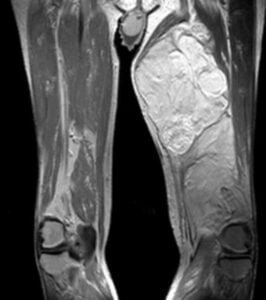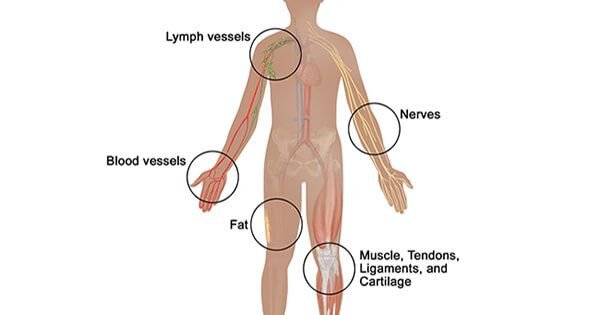Soft Tissue Sarcoma Overview
Soft tissue sarcomas are a group of rare cancers that develop in the connective tissues of the body, such as muscles, fat, blood vessels, nerves, tendons, and the lining of the joints. These cancers can occur anywhere in the body but are most commonly found in the arms, legs, and abdomen. At Fight Bone Tumors, Dr. Kishore B Reddy and our expert team provide comprehensive care for patients with soft tissue sarcomas, utilizing advanced treatment options and compassionate support.
Symptoms:
Symptoms of soft tissue sarcomas can vary depending on the tumor’s location and size, but common signs include:
- A painless lump or swelling that may grow over time
- Pain or soreness caused by the tumor pressing against nerves or muscles
- Difficulty moving the affected area
- Gastrointestinal issues if the tumor is in the abdomen
Early detection and diagnosis are crucial for effective treatment, so it is important to seek medical evaluation if you notice any unusual lumps or persistent pain.
Diagnosis:
The diagnostic process for soft tissue sarcomas involves several steps to accurately identify the cancer and determine its extent:
- Physical Examination: Initial assessment to evaluate symptoms and overall health.
- Imaging Tests: MRI, CT scans, and ultrasound to visualize the tumor and assess its size and location.
- Biopsy: A sample of the tumor tissue is taken and analyzed under a microscope to confirm the diagnosis.
- Staging: Additional tests are needed to determine if the cancer has spread to other parts of the body, which helps stage the disease and plan treatment.

Treatment Options:
Treatment for soft tissue sarcomas is tailored to the individual patient and may involve a combination of therapies:
Surgery:
- Wide Local Excision: Removal of the tumor along with some surrounding healthy tissue to ensure clear margins.
- Limb-Salvage Surgery: If the tumor is in a limb, efforts are made to preserve the limb while removing the cancer.
- Amputation: In cases where limb-salvage is not possible, amputation may be necessary to control the cancer.
Radiation Therapy:
- Often used before surgery to shrink the tumor or after surgery to kill any remaining cancer cells.
- Delivered with precision to minimize damage to surrounding healthy tissue.
Chemotherapy:
- Used to treat certain types of soft tissue sarcomas that are more likely to respond to these drugs.
- Administered in cycles, with specific regimens tailored to the type and stage of the cancer.
Targeted Therapy and Immunotherapy:
- Newer treatments that target specific molecules involved in cancer growth or boost the body’s immune system to fight cancer.
Our multidisciplinary team collaborates to develop personalized treatment plans aimed at achieving the best possible outcomes for our patients.
Support and Rehabilitation:
Dealing with soft tissue sarcomas involves more than just medical treatment. We offer comprehensive support services to help patients and their families through this challenging journey:
Physical Therapy:
- Essential for recovery post-surgery, aiding in regaining strength and mobility.
Emotional Support:
- Counseling and support groups to address the emotional and psychological impacts of cancer.
Nutritional Guidance:
- Tailored dietary plans to support overall health and recovery during and after treatment.
Follow-Up Care:
- Regular check-ups to monitor for recurrence and manage any long-term side effects of treatment.
FAQ's
Soft tissue sarcomas are a group of rare cancers that develop in the connective tissues of the body, such as muscles, fat, blood vessels, nerves, tendons, and the lining of the joints. They can occur anywhere in the body but are most commonly found in the arms, legs, and abdomen.
Common symptoms include:
- A painless lump or swelling that may grow over time
- Pain or soreness caused by the tumor pressing against nerves or muscles
- Difficulty moving the affected area
- Gastrointestinal issues if the tumor is in the abdomen
Diagnosis typically involves:
- Physical Examination: Initial assessment to evaluate symptoms and overall health.
- Imaging Tests: MRI, CT scans, and ultrasound to visualize the tumor.
- Biopsy: A sample of the tumor tissue is taken and analyzed under a microscope.
- Staging: Additional tests to determine if the cancer has spread to other parts of the body.
Treatment may include:
- Surgery: Wide local excision, limb-salvage surgery, or amputation.
- Radiation Therapy: Used before or after surgery to shrink the tumor or kill remaining cancer cells.
- Chemotherapy: Used for certain types of soft tissue sarcomas.
- Targeted Therapy and Immunotherapy: Innovative treatments targeting specific cancer molecules or boosting the immune system.
Limb-salvage surgery involves removing the tumor while preserving as much of the affected limb as possible, maintaining function and appearance.
Yes, common side effects include:
- Surgery: Pain, swelling, risk of infection, and rehabilitation challenges.
- Radiation Therapy: Skin irritation, fatigue, and potential damage to surrounding tissues.
- Chemotherapy: Fatigue, nausea, vomiting, hair loss, and increased infection risk.
Managing side effects can include:
- Fatigue: Rest, light exercise, and proper nutrition.
- Pain: Medications, physical therapy, and relaxation techniques.
- Emotional Stress: Counseling, support groups, and mind-body practices like yoga or meditation.
We offer comprehensive support services, including:
- Physical Therapy: To aid recovery and improve mobility.
- Emotional Support: Counseling and support groups for psychological well-being.
- Nutritional Guidance: Dietary plans to support overall health.
- Follow-Up Care: Regular check-ups to monitor for recurrence and manage long-term side effects.
Yes, soft tissue sarcomas can recur, either at the original site or in other parts of the body. Regular follow-up appointments and monitoring are essential to detect and treat any recurrence early.
You can schedule a consultation by calling us at +91 9032027279 or emailing info@fightbonetumors.com. Our team is here to provide personalized care and support.





